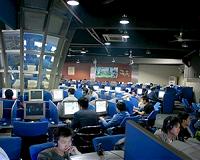 |
Washington (AFP) May 10, 2011 Sony said Tuesday it will be at least a few more days before it restores the PlayStation Network, which has been offline since it was targeted by hackers last month. "I know you all want to know exactly when the services will be restored," Sony spokesman Patrick Seybold said in a statement posted on the PlayStation blog. "At this time, I can't give you an exact date, as it will likely be at least a few more days," Seybold said. "We're terribly sorry for the inconvenience and appreciate your patience as we work through this process." The Internet vigilante group Anonymous meanwhile again denied carrying out the attack on Sony's online services, but said it could not rule out that some of its members were responsible. "While it could be the case that other Anons have acted by themselves AnonOps was not related to this incident and it does not take responsibility for whatever has happened," Anonymous said in a YouTube message posted at anonops.blogspot.com. "A more likely explanation is that Sony is taking advantage of Anonymous's previous ill-will towards the company to distract users from the fact that the outage is actually an internal problem with the company's servers," it said. The loose-knit "hacktivist" group carried out 'distributed denial of service' attacks against Sony last month in retribution for its legal action against hackers who cracked PlayStation 3 (PS3) defenses to change console operating software. In a typical DDoS attack, a large number of computers are commanded to simultaneously visit a website, overwhelming its servers, slowing service or knocking it offline completely. Sony, in a letter to the US House Subcommittee on Commerce, Manufacturing and Trade last week, noted that the large-scale data theft came shortly after the PlayStation Network suffered the DDoS attacks from Anonymous. "Whether those who participated in the denial of service attacks were conspirators or whether they were simply duped into providing cover for a very clever thief, we may never know," Sony said. "In any case, those who participated in the denial of service attacks should understand that -- whether they knew it or not -- they were aiding in a well-planned, well-executed, large-scale theft that left not only Sony a victim, but also Sony's many customers around the world," it said. The attack by hackers resulted in the theft of names, passwords, email addresses and possibly credit or debit card information from more than 100 million accounts on various Sony online platforms. Sony shut down the PlayStation Network and its Qriocity music streaming service on April 20 to investigate the hack and secure the platforms from future attacks. The Japanese company later said its Sony Online Entertainment platform had also been targeted by hackers. According to Sony, 77 million PlayStation and Qriocity accounts have been affected along with 25 million Sony Online Entertainment accounts, bringing the total to more than 100 million. Sony chief executive Howard Stringer apologized last week to the millions of users of the company's hacked online networks. The PlayStation Network system was launched in 2006 allowing PS3 console gamers to compete online, stream movies and access other services via the Internet.
Share This Article With Planet Earth
Related Links Satellite-based Internet technologies
 US privacy groups welcome 'Do Not Track' bill
US privacy groups welcome 'Do Not Track' billWashington (AFP) May 9, 2011 Privacy and consumer groups welcomed a "Do Not Track" bill introduced in the US Senate on Monday that would let Internet users block companies from gathering information about their online activities. The Do-Not-Track Online Act of 2011 was introduced by Democratic Senator Jay Rockefeller of West Virginia, the chairman of the Senate Committee on Commerce, Science, and Transportation. "Re ... read more |
|
| The content herein, unless otherwise known to be public domain, are Copyright 1995-2010 - SpaceDaily. AFP and UPI Wire Stories are copyright Agence France-Presse and United Press International. ESA Portal Reports are copyright European Space Agency. All NASA sourced material is public domain. Additional copyrights may apply in whole or part to other bona fide parties. Advertising does not imply endorsement,agreement or approval of any opinions, statements or information provided by SpaceDaily on any Web page published or hosted by SpaceDaily. Privacy Statement |